AI Job-Application Agents: Should You Let a Bot Apply for You?
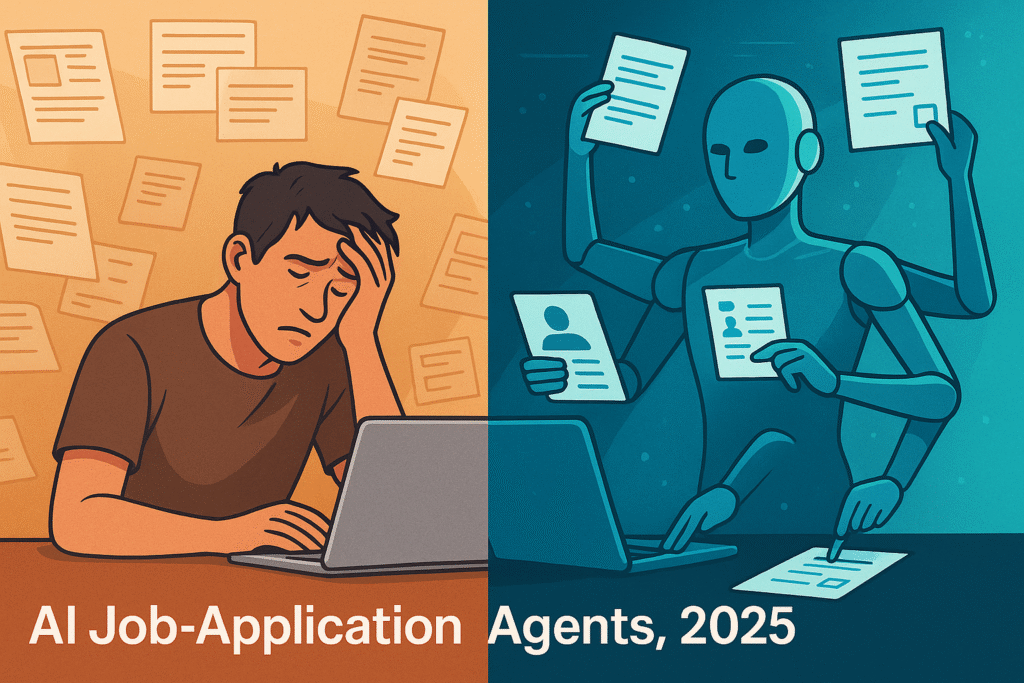
Job hunting in 2025 still feels like a part-time job. You scroll listings, tweak resumes, and re-enter the same data—again and again—just to score one interview.
Enter the AI job-application agent. One developer blasted 1,000 applications in 24 hours and netted roughly 50 interview invites—a story that lit up social feeds.
Suddenly the market split: fire-hose bots that spray hundreds of resumes per hour versus selective agents that send only well-matched submissions.
This guide untangles that divide so you can decide whether an AI agent deserves a spot in your search toolkit.
What exactly is an AI job-application agent?
An AI job-application agent is software that scans job ads, scores your fit, and sends custom applications without you hovering over every form.
Think of two helpers at the same online form:
Helper 1 is a browser plug-in that pastes your name and resume everywhere (fast, yet mindless).
Helper 2 reads the description, compares it with your skills, tweaks a line or two in the cover-letter field, and applies only when the match looks strong. That second helper is the AI agent.
Agents move at a speed no human can match, and Apply IQ users report saving more than six hours of form-filling each week. LoopCV says its crawler checks more than 50,000 company career pages each day before deciding which roles to target. Their first step is job discovery: real-time vacancy feeds from Adzuna, whose index tracks more than one million live UK jobs and underpins the Office for National Statistics online advert estimates, ensuring an agent sees openings minutes after they appear. Next, large-language-model matching ranks relevance by keywords, seniority, and pay, and then a generation layer fills forms in your voice. JobCopilot even learns from your edits so later applications echo your tone instead of bland AI text.
Once you set your filters, the agent takes the night shift. It scans, scores, applies, and logs every submission so you can follow up later.
The key takeaway: autofill delivers speed, while an AI job-application agent combines speed with strategy.
Why use an auto-apply bot?
An auto-apply bot protects two scarce resources: hours and focus.
Time. Filling out dozens of near-identical forms after work drains energy you could spend on networking or skill-building. Letting software handle the repetition gives those evenings back to you.
Reach. High-volume tools can drop your resume into hundreds of queues overnight. According to WIRED, LazyApply once sent 5,000 applications and produced about 20 interviews, showing that scale can open doors even when the hit rate is tiny.
Reality check. Recruiters face their own flood of resumes; many roles pull in hundreds of applicants within a day. A LinkedIn talent-acquisition report found that Indeed averaged 376 applications for every hire in 2024. Volume alone rarely breaks through those filters, which is why smarter agents cap daily submissions or apply only when the match score is high.
Psychology. Watching a dashboard tick upward while you sleep can trade job-hunt anxiety for momentum. A full pipeline makes any single rejection easier to shrug off.
What bots can’t do: add skills you don’t have, trick Applicant Tracking Systems, or safeguard your data once you share platform logins.
Treat the bot as a power assist. Let it cover routine openings while you invest manual effort in dream roles, keeping volume high and relevance higher without burning out.
A Closer Look at Today’s AI Job-Application Agents
From high-volume bots that flood job boards to curated tools that prioritize fit over quantity, today’s AI job-application agents come in many flavors. Below, we break down the leading options so you can decide which approach best matches your career goals.
Apply IQ: quality-first AI agent
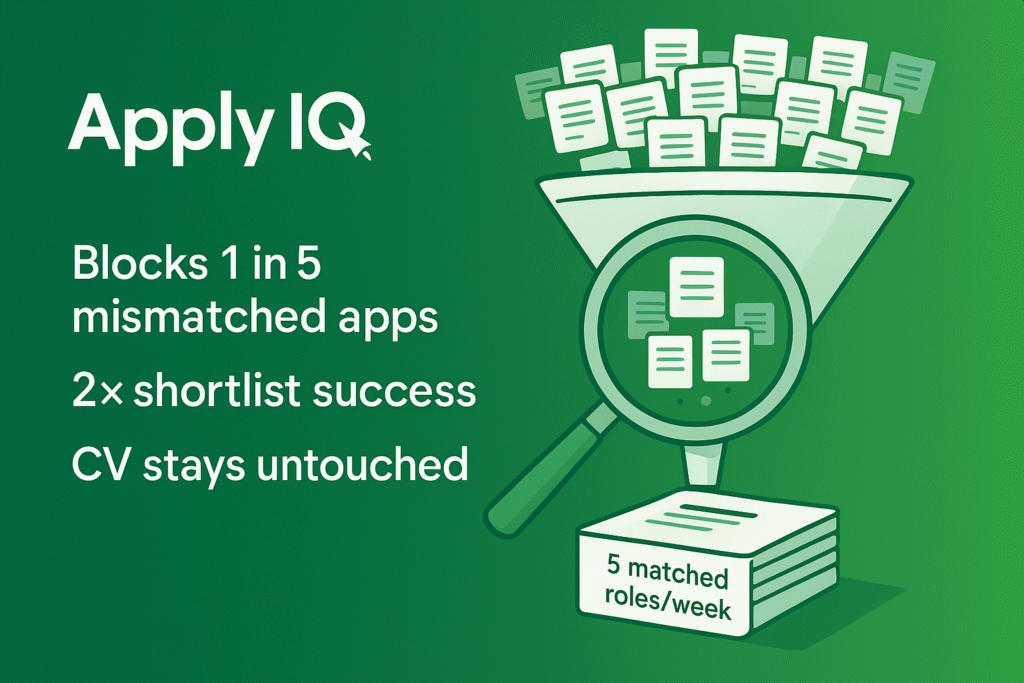
Apply IQ is Adzuna’s free AI tool that auto-applies to roughly five highly matched jobs per user each week.
Designed to fight “easy-apply” spam, Apply IQ’s language-model matcher blocks one in every five applications a human might send and makes users with high match scores twice as likely to reach an interview shortlist compared with typical manual applications, according to Onrec.
Key safeguards keep relevance high:
- No resume rewrites; the CV you upload is the one employers see.
- A hard limit of two applications to the same employer within 60 days.
- Regular activity checks that pause inactive accounts.
Apply IQ is free in beta on Adzuna’s UK and US sites. Upload a resume, set your preferences, and let the agent handle sourcing and submissions while you get ready for interviews.
If LazyApply relies on volume and LoopCV blends breadth with filters, Apply IQ is the precision pick: fewer shots, higher odds.
LazyApply: high-volume autopilot
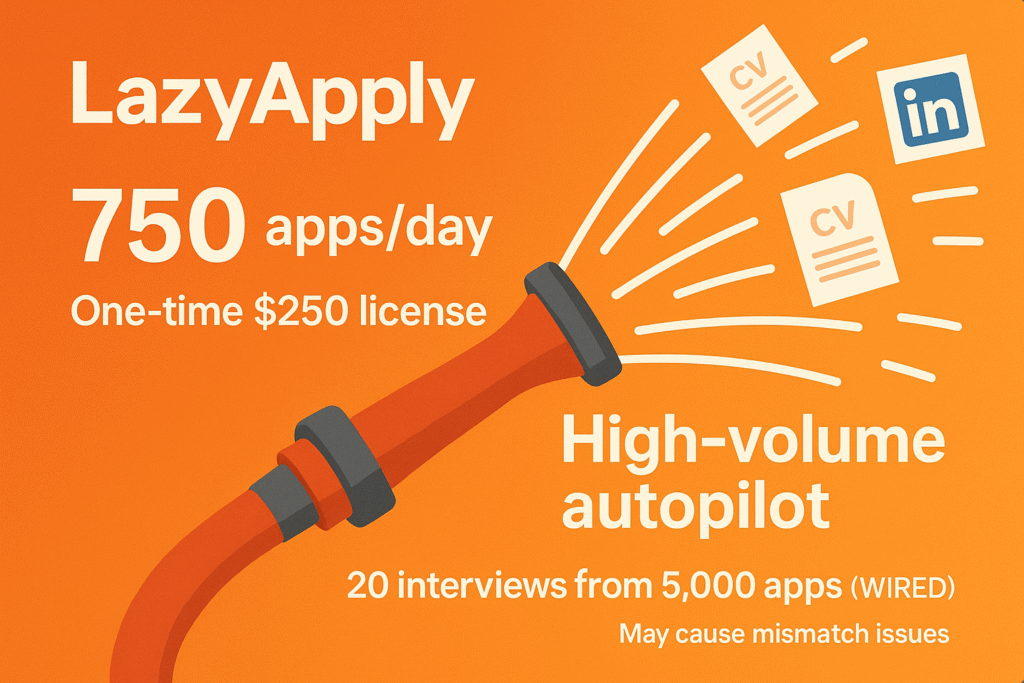
LazyApply is a Chrome extension that swaps precision for reach. Pay a one-time license fee of about $250, and the bot can fire up to 750 applications a day to sites such as LinkedIn and Indeed, according to WIRED.
That fire-hose output attracts early-career candidates or career switchers who need visibility fast. WIRED profiled one user who sent thousands of resumes in a single weekend, numbers no human could match.
Volume, though, comes at a price. The tool scans for keywords, so spotting “Python” in a senior data-scientist role is enough for it to apply. Recruiters see the mismatch, ATS filters flag it, and success rates dip into the low single digits. The same WIRED story counted 20 interviews from 5,000 submissions.
LazyApply also clicks through your active LinkedIn session. The rapid activity can look unnatural, and some users worry about account flags, although confirmed bans remain rare.
Bottom line: LazyApply shines when you need exposure now, the roles have low entry barriers, and you’re ready to wade through a flood of recruiter emails. Outside those lanes, the “spray and pray” model often adds noise instead of progress.
LoopCV: smarter matchmaker, still hands-off
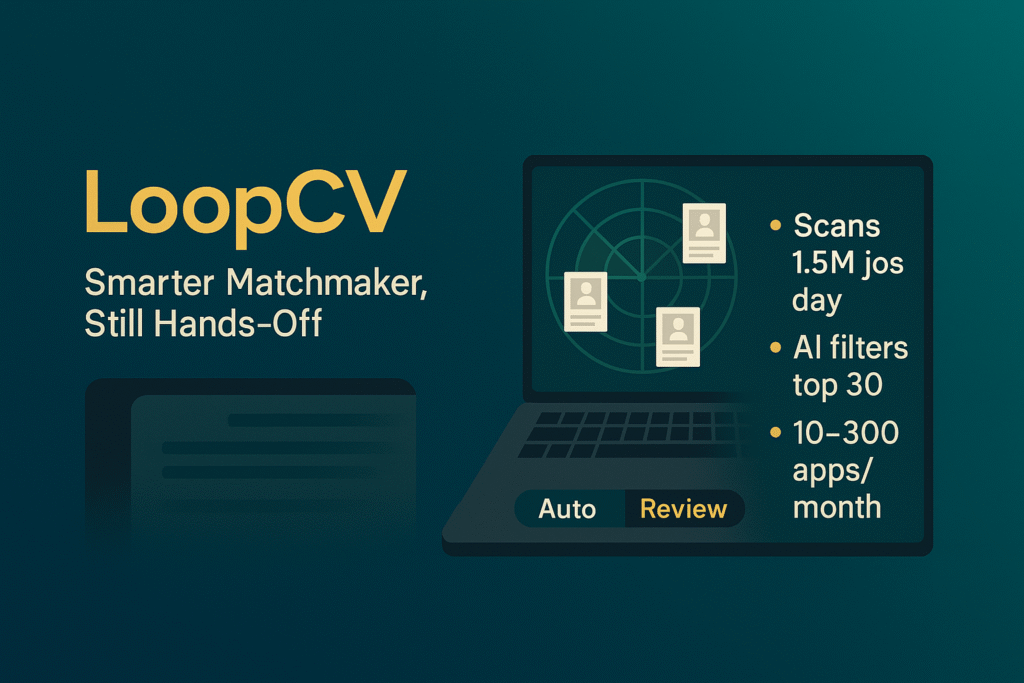
LoopCV is a job-search automation platform that checks each posting against your resume and applies only when the match clears its AI threshold.
Its reach comes from breadth, not brute force. The company says its crawler reviews about 1.5 million new jobs a day across more than 30 boards before narrowing them to roles that suit each profile.
Setup is quick: upload a CV, choose titles, locations, and salary ranges, then decide whether to let the bot auto-apply or hold drafts for review. The free tier covers 10 total applications, while paid plans jump to 100 or 300 submissions per month.
Because LoopCV screens first, daily output falls from hundreds to, at most, a few dozen. Users report recruiter replies that mention skills the algorithm highlighted—proof that its language-model matcher looks beyond simple keywords.
Trade-offs remain. Full autopilot means trusting an algorithm to present you, and a subscription keeps ticking until you land a job. If LazyApply is a fire hose, LoopCV is closer to a garden sprayer: wide coverage with less mess.
Simplify Jobs: common-app autofill
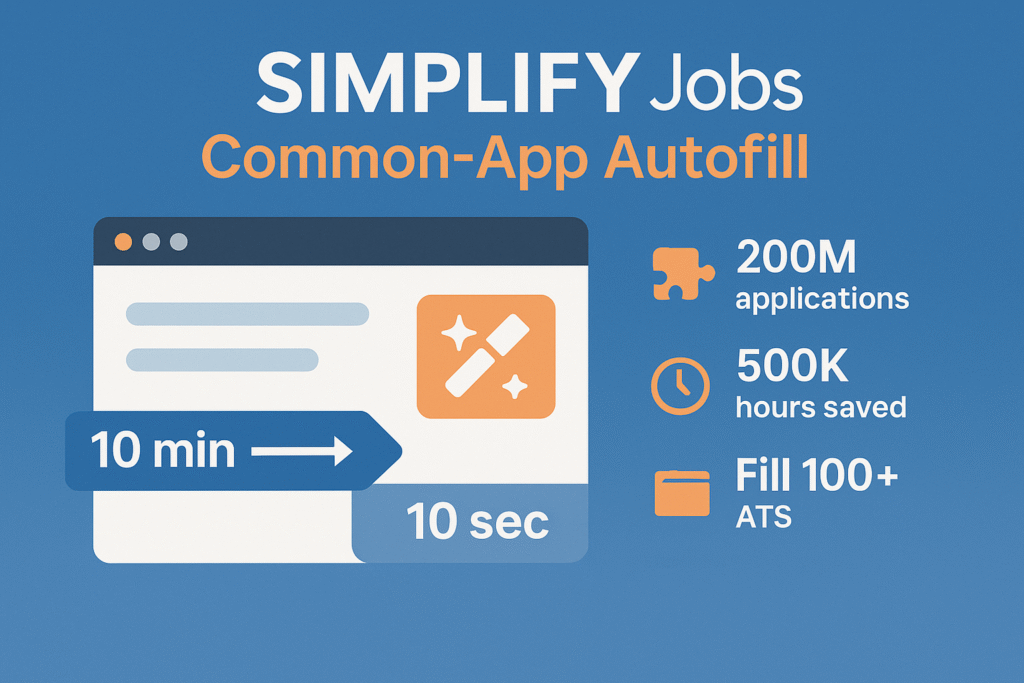
Simplify is a free browser extension that autofills job-application forms so you spend seconds, not minutes, on each submission.
Create one profile, click Apply, and the plug-in copies your basics—education, work history, links—into hundreds of applicant-tracking systems such as Greenhouse, Lever, and Workday. The company says users have filed more than 200 million applications and saved over 500 thousand hours of data entry since 2024.
Because you still pick every role, quality remains high. You read each description, tweak your resume, and skip listings that feel off. Simplify removes the typing. Recruiters get complete, typo-free forms, and you keep full visibility of where your name goes.
Throughput is the ceiling. Even with one-click autofill, you’re still the bottleneck; on a good Saturday you might manage fifty thoughtful applications—far short of the hundreds an autopilot bot can fire off.
Where Simplify shines is efficiency without giving up control. Think of it as power steering for a manual search: you drive, it lightens the turn, and every saved minute is free upside.
Massive and other newcomers: human touch at a price
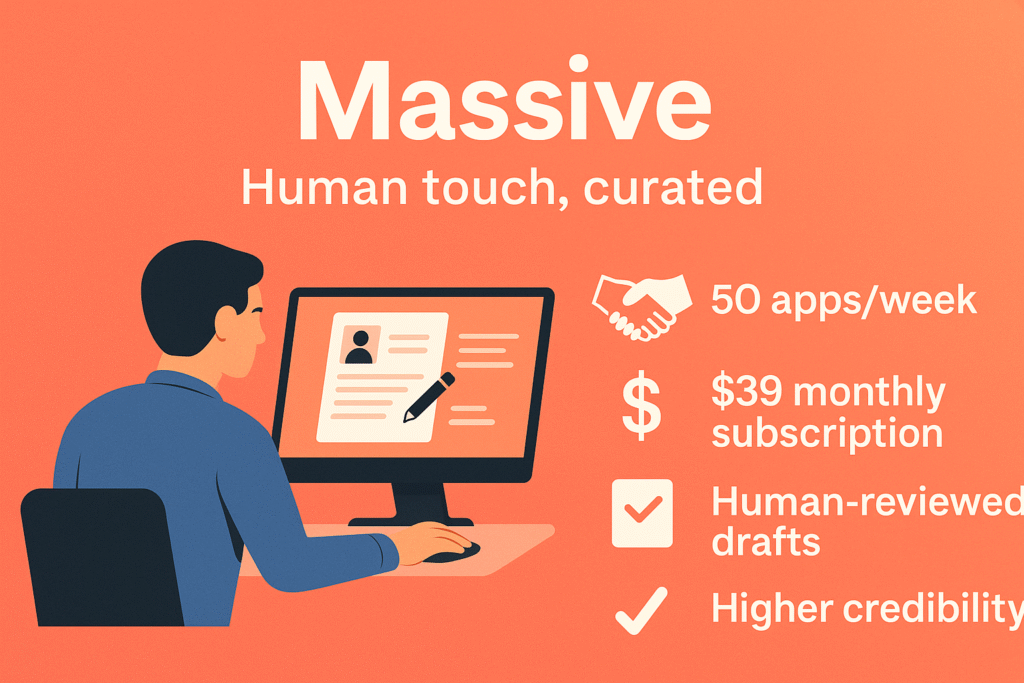
Massive is a subscription service that sends up to 50 job applications a week for $39, and a human reviewer checks every draft before it goes out, according to WIRED.
Human oversight polishes free-text answers, catches mismatched roles, and spares recruiters the “wrong-fit” fatigue pure automation can cause. The trade-off is throughput; people move slower than code, so you pay more for fewer, cleaner shots.
Several rivals copy the concierge model. Sonara (now closed) once charged $80 per month for up to 420 applications, and new “Sonara replacement” startups now aim at niches like remote-only tech or government-clearance roles.
Concierge services suit specialists or anyone burned by scattershot bots. They offer peace of mind because each submission shows clear intent. The risk, as with any young startup, is stability: funding, staffing, or policy changes can shift service quality overnight, so keep a backup plan ready.
Think of these services as boutique recruiting agencies inside software: higher curation, higher cost, and potentially higher credibility.
How to choose the right agent for your job hunt
Selecting an AI job-application agent comes down to five levers: goal, platform fit, autonomy, cost, and risk.
- If you’re switching fields and need volume, a high-capacity plug-in like LazyApply makes sense. Targeting a handful of dream roles? A quality-first service such as Apply IQ—or even a human-review model like Massive—keeps noise low.
- Platform fit. Browser extensions shine on LinkedIn and Indeed. If you comb through company career pages or niche boards, LoopCV’s crawler surfaces listings you’d otherwise miss.
- Decide how much control you’re willing to give up. Fully automatic agents can send applications while you sleep; review-mode tools (or Simplify’s autofill) let you approve each one.
- Free tiers and one-time licenses feel painless, but a $40 subscription that trims your search by even two weeks pays for itself on the first paycheck. The average U.S. job hunt still lasts about 20 weeks, according to ConsumerAffairs.
- Privacy & risk. Any bot that signs in to your LinkedIn can trip automated flags or expose personal data; use strong passwords and read each vendor’s policy. Quality-first agents that work inside a job board’s own ecosystem carry lower account-ban risk.
Quick rule of thumb:
- Need speed and volume → high-capacity plug-in.
- Want breadth without junk → AI matcher with optional review.
- Prioritize curation and safety → quality-capped or human-assisted service.
Match these levers to your search stage, and the right agent becomes clear.
Best practices to turn bot clicks into real interviews
Treat your AI agent as a junior assistant: helpful, quick, and still learning.
- Audit the log weekly. Open a few submissions and confirm the job titles still match your goals; five minutes of quality control now prevents an awkward phone screen later.
- Feed it strong inputs. A polished resume and an updated cover-letter template travel just as fast as a sloppy one, so tune them first.
- Coach the algorithm. Tools like LoopCV learn from your edits; rewriting the first batch of generated answers improves every batch that follows.
- Network during the saved hours. About 85 percent of jobs are filled through networking, according to Zippia. Use the reclaimed time to message hiring managers or join industry groups.
- Respect platform limits. If a vendor caps weekly submissions, leave the ceiling in place; LinkedIn’s anti-spam systems look for unnatural surges.
- Track outcomes. A simple spreadsheet of interviews, rejections, and ghosted applications reveals which keywords or salary bands produce callbacks—data you can feed back into the agent.
Conclusion
AI job-application agents are reshaping the job search in 2025. Whether you lean toward high-volume tools like LazyApply, precision-focused options such as Apply IQ, or human-assisted services like Massive, the key is alignment with your goals. Bots can’t replace your skills, experience, or networking, but they can free up valuable time and energy.Bots can’t replace your skills, experience, or networking, but they can free up valuable time and energy—as long as your resume still passes resume screening AI. Treat them as assistants that handle the repetitive clicks while you focus on building relationships, tailoring your pitch, and preparing for interviews. By balancing speed with strategy, you’ll turn automation into real career opportunities.
FAQ
Are AI job-application agents safe to use?
They can be, but risks exist. Some tools require access to your LinkedIn or job-site accounts, which may raise privacy or account-suspension concerns. Always read a platform’s policies and use strong passwords.
Will using a bot get me banned from LinkedIn or job boards?
High-volume bots that mimic unnatural activity carry the highest risk. While bans are rare, account flags can happen. Tools that apply within a job board’s own ecosystem (like Apply IQ on Adzuna) are generally safer.
Do recruiters know when a bot applies for me?
If the tool generates sloppy or irrelevant applications, recruiters will notice. Quality-first agents or human-assisted services make submissions harder to distinguish from manual applications.
Can bots actually increase my chances of landing a job?
Yes—by boosting your reach or saving time for networking and interview prep. However, bots alone won’t guarantee success; they work best when paired with polished resumes, thoughtful edits, and human effort.
Which type of bot should I choose?
Need speed and exposure → LazyApply or similar high-volume tools.
Want breadth with smarter filtering → LoopCV or Apply IQ.
Prefer curation and quality → Massive or other concierge services.
Looking for efficiency without automation risks → Simplify autofill extension.
How many applications should I let a bot send?
More isn’t always better. Monitor outcomes, adjust filters, and cap daily or weekly submissions to avoid overwhelming yourself—or recruiters—with low-quality leads.
Will AI replace the need for networking?
Not at all. Around 85% of jobs are filled through networking. AI can get your resume in more stacks, but relationships and referrals remain the strongest drivers of interviews and offers.
